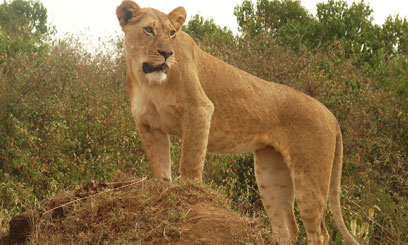To counter the alarming decline of Africa’s wildlife and habitat due to development and land fragmentation, John Keen, 86, and his family have protected their land through the conveyance of an environmental easement to the African Wildlife Foundation (AWF) and Kenya Wildlife Service (KWS).
Keen’s land is adjacent to Nairobi National Park and the execution of a voluntary environmental easement adds over 100 hectares of habitat to the Park.
Nairobi National Park, one of Kenya’s most visited parks, is dependent upon the open lands to the south for wildlife movement, habitat and dispersal. These private lands have become increasingly threatened from land sales, land conversion and habitat fragmentation, putting the entire Park at risk.
“I want this land to remain pristine today and in the future for wildlife and future generations,” said Mr. John Keen passionately.
“We have destroyed so much of our land and wildlife, it is time to save this country of ours!” Keen reflected on the changes he has seen in Kenya over his lifetime, the depletion of wildlife and land, and how he hopes his effort will help preserve a bit of what is special about Kenya.
The easement was signed at a ceremony at the Masai Lodge, a lodge owned and operated by the Keen Family. It was attended by the Keen Family, Dr. Helen Gichohi, President of the African Wildlife Foundation, Julius Kipng’etich, Director of Kenya Wildlife Service, Erna Kerst, Director of USAID and AWF, KWS and USAID staff.
“Kenya’s national parks, sanctuaries, and reserves safeguard roughly 8 per cent of the country’s land for wildlife habitat, but these protected areas are small to support viable populations of wildlife and not connected,” said Gichohi.
“To secure Kenya’s remaining wild places, we need creative solutions like easements.”
“KWS would like to thank the Keens for their leadership in executing Kenya’s first environmental easement,” said Kipng’etich. “Nairobi National Park was one of Kenya’s first established national parks, so it is appropriate that this easement, being the first in Kenya, is adjacent to the Park.”
“The value of the property under easement will increase tremendously in coming years and change the fortunes of the Keen family while contributing to conservation for posterity. Wildlife conservation is not about competition; it’s about partnerships and cooperation for the benefit of all,” said Kipng’etich.
AWF has been working with the Keen family for over a year on the details of the easement, which is a voluntary agreement that restricts certain uses of the land in order the keep the land open for wildlife. The Keens retain full ownership of the land, but are subject to the restrictions agreed upon by the land owner and the holder of the easement. USAID has long supported livelihood improvement and conservation in the Kitengela region. All speakers thanked the strong support and strong partnership of USAID.
The easement model is to be replicated in the Taita ranches as well as wildlife-inhabited areas in Loita plains, Kerio Valley, Samburu plains and Tana Delta, among other places across the country.
“We are delighted to be part of this historic event,” said Erna Kerst, Director USAID. “It is a hopeful and extremely exciting day for the Keens, our partners and all Kenyans.”
“Environmental easements have proven highly effective in other parts of the world, and we believe that they have great potential to be equally successful in Kenya,” said Kathleen H. Fitzgerald, Director for Land, AWF. “We applaud the Keen family for their decision to place their land under an environmental easement and hope that their conservation leadership will inspire other landowners to do the same.”
By helping to establish the first environmental easement in Kenya, AWF continues its 50-year tradition of working to protect large landscapes by pioneering innovative conservation solutions that benefit both people and wildlife.










































